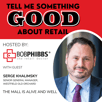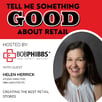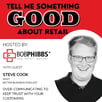Retail Podcast 706: Elizabeth Herbst-Brady Keep Your Customer At The Center
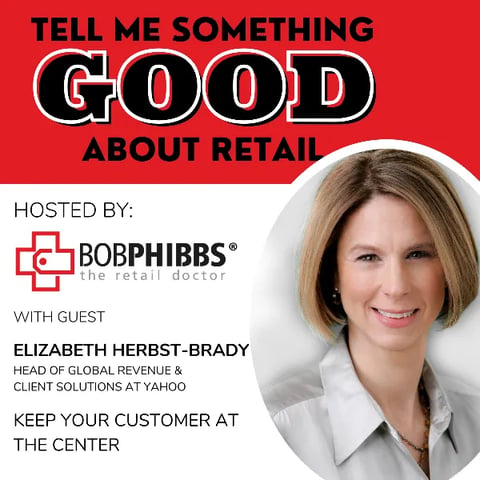
Bob Phibbs interviewed Elizabeth Herbst-Brady, head of Global Revenue & Client Solutions at Yahoo on strategies and metrics for success and connectivity - and more - on this episode of Tell Me Something Good About Retail.
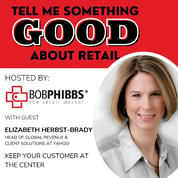
Tell me something good about retail
Elizabeth Herbst-Brady Keep Your Customer At The Center
Bob: Today, I’m talking with Elizabeth Herbst-Brady, she is currently head of global revenue and client solutions at Yahoo. Welcome.
Elizabeth: Thank you. I’m thrilled to be here.
Bob: I have to ask the basic question, what is Yahoo today? It’s been a lot over the years, generations, they were the innovator, then all sorts of things, and here you are.
Elizabeth: I know. So, I’m really glad you asked. It definitely has been an evolution. So, today, it’s a suite of about 20 iconic brands, and we’re organized into five different business units. So you have Yahoo Finance, Yahoo Sports, you had the whole mail search ecosystem, you have AdTech, and you have subscriptions. It reaches about 900 million people every month, so very, very big. The third-largest visited internet property globally. And then we have the technology that connects marketers, agencies, and customers, and publishers to the entire advertising ecosystem. It’s really exciting.
Bob: So, basically, you do everything.
Elizabeth: We are at the intersection of marketing, media, and technology, I like to say.
Bob: I love that. Well, I’m going to start off by asking what was your first job? Because that seems to be the one everybody tends to think, “Oh, they were always where they are now.” And dollars to donuts, I find most successful people seem to start in retail, is that your case?
Elizabeth: So, I love that you said donuts because my first job was at a store in Chicago, at the corner of State Street and Division, it was called Winston’s Ice Cream And Donut Shop. And I actually had to get my parents to sign a form that allowed me to work there because I was under 16. I never honestly have worked as hard in my life or since. I did both the morning shift and the afternoon shift on the weekends. The morning shift during the week in the summer, you have people that were racing in, getting their coffee, wanted to have their donut. And in the afternoon, there were 33 different flavors, and so everybody trying to choose what flavor they want, and inevitably you are running out of chocolate chocolate chip, and so you had to race downstairs and get more. It was an incredible introduction to how you really have to listen to what customers need, right, which is the essence of retail, and how you work with your boss, how you work with your colleagues. It was hard and fun, but great.
Bob: I’ve always said that retail, Elizabeth, is the thing that normalizes you, you realize it’s about somebody else first. And if you don’t learn that then, you can be a side hustle already, and people are doing all sorts of...but until you learn that somebody else is more important than you, I think you struggle. Would you support that?
Elizabeth: I absolutely agree. And I would say here, if you can look at kind of the extension of my career, as I’ve migrated between media, marketing, and technology, that core principle of you got to think about the customer, all those businesses, when you focus on the customer, you’re good, and the minute you stray away from the customer, you have a lot of problems. And I really think about retail being at the tip of the spear of how customer behavior and business evolves, both the challenges and the opportunities.
Bob: Okay, so you have to explain tip of the spear for our listeners.
Elizabeth: Really right in the forefront of everything that happens. So I’ve had the pleasure of listening to a number of your podcasts, which are amazing.
Bob: Thank you.
Elizabeth: And you had a lot of your guests talk very eloquently about the challenges and the opportunity associated with big box. So, what is that experience when you’re going into the store? So when you think about those challenges, it was a precursor to everything else that was happening then after, for media, marketing, insurance, what have you. But when Best Buy was first experiencing difficulty with supply chain or being able to...how they were showing all their various products and what it was like or the difficulty to return, or whatever it was, that was just a precursor to what was going to happen with the disruption of technology and online, right? And when they were able to start to bring that together, it created a better experience.
Bob: Well, you bring an interesting point, because there are people now who say the store is the media. Isn’t that interesting?
Elizabeth: Look at what Steve Jobs architected around the Apple store, right? That Apple store is way more than a place to go buy an Apple product, right? And I think the people who can get that right really have an opportunity, because a good in-store experience, for me, is still the greatest possible thing. It’s way more satisfying than anything else.
Bob: I can’t argue with that, since I make my living by brick-and-mortar stores, so there you go. You’ve got a history of elevating the voice of the customer. So, how have you done that? Because with billions of people who are looking at everything that happens these days, you’d think, “Well, that should be easy,” but knowing the right voice of the customer, and then, “Oh, this is what Bob thinks.” My dad was a pastor and I was a conductor. So he’d say, “Be careful when people come up to you and say, “Oh, this is what everybody thinks. I’m just voicing it.” That’s really them. So, how do you elevate that voice of a customer and know what that is?
Elizabeth: Well, look, I think that that is really the value and excitement of technology, it gives us the opportunity to have real-time data. You always have to look at the data very hard because data is only as good as the inputs that go into it, but everything from how you can understand the journey of a customer, right, and you can offer that in partnership with whether it’s a client or a publisher, you can show them in real time what’s happening, you can ask, there are all sorts of survey mechanisms, you could say, “What do you think?” And then ultimately, depending on what the goals of a campaign or an activation are, you can clearly go back and level set to, “Did I get the outcomes that I was looking for?” Right? And I think as marketers have gotten more successful, and sophisticated about thinking about that, it really offers an opportunity.
We do something for consumer-packaged goods called In-flight Sales Analysis, which actually allows them to follow through the funnel from awareness down to activation. It’s a combination of a bunch of data services and technologies, and it’s wonderful, it’s really wonderful. Because here’s the thing, I think the idea that you’re always going to get it right is really flawed, right? You know that you need to adjust and evolve and gosh, if the last couple of years have shown us nothing else is that we know the world is going to continue to change.
Bob: I would agree with that. It’s funny, in looking back at the last couple years, so many people tell me, “The world has changed forever, it will never be like...” “Well, kind of.” But it’s like, “The great resignation, everyone’s quitting, they’re all doing side hustles,” for now, and now we’re hearing they’re coming back, right? That a million...was it a million, billion retirees are coming back into the system now because either their 401(k) crashed or they just missed people. And I think it becomes online. “It’s all going to be online, brick and mortar’s dead.” And now everyone’s going to the mall. That wasn’t supposed to happen.
So, the more things change, I think what I like about what you’re saying is if we can drill down and become brilliant on the basics, that’s what’s missing to me. I think a lot of people chase the shiny object. “Oh, it’s metaverse, great,” whatever that is. But the person standing in front of you, the person on your website right now wanting to buy from you, what are we doing that gets in the way and adds friction? And then how do we get past that? Isn’t that the great challenge? Because I work for that in a store, but there’s so many more things when you’re thinking about online, right? Are they on an app? Are they checking email? Is this in the middle of a Facebook promo? So what kinds of things do you think marketers need to be aware of as they’re chasing, maybe new funnels, maybe old funnels just a little differently? What would be some of the things that you would think?
Elizabeth: You’ve hit on so many different really important issues. Can I start with, you were talking about kind of the expectations around work and if it’s in person or online. I think because it extends to when are we going to do something online, in general, beyond work versus go in-person? And I think it’s really about being clear, what is the purpose, right? What problem are you solving? What need are you meeting in whatever it is that you’re trying to interact with? And if the need can be met better, or differently, or augment whatever you’re trying to accomplish in-person, then people have that experience, and then they’ll be able to do that. If it’s actually easier and more productive and more successful individually and on a screen, then they’ll do that. But again, that’s going that next level down and saying, “Why are we doing this? What are we trying to accomplish?” And that’s, I think, where you get that intersectionality. So that’s the first thing.
I think the second thing is when you talk about that friction, again, the constraints and catalysts to change, right? So can you not change something because there’s a consumer need that you’re going to be violating? Or can you not change something because you have an arcane process or structure and systems that don’t talk to each other? Right?
Bob: Well, that’s huge.
Elizabeth: And by the way, you’ve seen that evolution. When the CRM for online didn’t match even the loyalty programs that people were using in store, that’s a huge problem. But I’ve seen progress against that. Again, you had Ron Thurston on, right? I didn’t realize he had worked with INTERMIX, one of my very, very favorite brands, they have gotten very good at tying their online and offline experience. So we have an INTERMIX right here in the Upper West Side that I love and I go into. Obviously, during the pandemic, not quite as much, but they also have very good CRM, they know what I like, they send me a lot of notices and suggestions. And then I immediately get connected with the store in the Upper West Side, I can either call them or email them, I can go in and try it on, they can give me other suggestions. And it’s really, they know who I am everywhere. And that’s great. It makes it better for me. And then when I go in, I get a really good experience.
Bob: So basically, they have all your data on you, and they can...
Elizabeth: And they’re using it appropriately. Because that’s the other thing...and again, that’s a whole another topic, but I think very important to think about, for the future, you have to have authenticity, and what is the value to the consumer. And if you’re not actually driving value to the consumer, you probably can’t do it.
Bob: Well, that’s the challenge for everybody is personalization is the mantra. But I remember back in the ‘80s, and were watching a PBS documentary, it’s called “We Know Where You Live.” it was a guy in San Francisco, he was a writer, and he goes into this marketing company and he’s like, “So, show me what all you can do.” And he’s like, “Oh.” And he goes, “Do you need my address?” I think they said, “No, you probably have a digital footprint.” So, they were able to go in, they go, “Oh, this is probably you. You have a newborn daughter, right?” He’s like, “Yes.” And they just showed for the money, each time they add a little more search that it’s like, “Oh, you are in a highly valued neighborhood, and here’s how it all goes.” And I think that was 40 years ago when they had far less data. And everybody says the goal is personalization to one, do you think that’s possible with AI and everything we’re hearing? Or is that more hype than practicality? Because at some point, you’re saying, “So I reached Jane and I know she has all this stuff,” does it move the needle or does it become intrusive?
Elizabeth: I think that’s a very long conversation is what I would say. You have to sit on the side of the consumer with all this. There’s what you can know and then what you do about it. Right? Those are two different things. And then how you use that customer feedback loop to understand if you’re driving value. Allstate knows exactly who I am, right? I don’t know if Tide may know exactly who I am, if I choose to let Tide know exactly who I am, or Tide may know that I like to shop at Stop & Shop. Right? It will just depend on how I choose to expose myself to the world. And then where it’s one-to-one or where it doesn’t need to be one-to-one. Right?
Bob: Yes. And you may not have given permission for Tide to know, but you might have given it to Kroger one time, and they know...That’s what I think some people miss, the Holy Grail is the basket, if you know the shopping basket, you know the house, you know the budgets, you know the private label, you know all of that, the kids, the health, all of it, which is why Amazon and the rest are trying to link all those things together. I’m going to turn a little bit, you were in charge of sales teams, correct?
Elizabeth: I’ve been in charge of...I am currently in charge of a very large sales team and revenue team.
Bob: That’s what I thought. So, do you believe in a sales process for your team, or do they all do their own thing? And you’re talking about nearly 2000 people, how does that play out across a large team? Because it’s the same for retailers, people have many stores, same idea, theoretically, the brand is the experience, but it all gets down to what does each individual bring?
Elizabeth: Exactly, exactly. Look, I think the job of a global leader, and leadership team by extension, is to set the clear strategy and the parameters and hopefully the metrics so everybody understands how you’re going to understand success. But you have to allow for connectivity. And that’s not just the leadership, that’s the middle-level managers, and then we’re going to...You were talking earlier about if people want to come into work or stay at home, that’s about employee engagement. And that has to go down to the individual employee, people have to feel engaged. And to do that, I think they have to feel connected, they have to feel empowered, but they have to also feel that they have what they need to accomplish what they need to accomplish. So, I’m very much of the philosophy, if I want to drive something that’s consistent, I have to be able to demonstrate why it’s valuable. Right? If I’m saying I want everybody to walk to the right first, I have to be able to demonstrate why it’s successful.
So, you talked about sales process, I do believe that sales process is very important. I’m a big process person. I try to keep it simple so everybody can understand it. And for me, it starts with the customer. So, you want to really start with what is your customer need, and then you think about what you’re offering is, and then you’re bringing your offering forward to the customer. I think a lot of times sales process starts with what you’re selling, and you’re pushing it out to the customer. You asked me about tip of the spear, to me, retail is the quintessential manifestation of that, right? You have a store to buy things, are you pushing them out? No, you’re thinking about those things as meeting a need for the customer, and then they come in and they want to take them, right? Like, it’s a virtuous cycle. But it’s just a slightly different pivot, isn’t it?
So again, I like to think it’s a fairly simple process when we think about from an annual planning and then the accountability metrics. But the reality is, the globe is a big place, the laws are different, like the laws in France are different than the laws in the U.K. that are different than the laws in the U.S. around how marketing and media are even allowed to function. So, to say you have to do exactly the same down to the nth degree, that’s not possible, because then you would be not being compliant.
Bob: Yes. And that’s really a big deal.
Elizabeth: Right. And so, but there are other things that can be...it’s cleaner. Like, if we understand how a publisher is working with us across the globe, that’s to the benefit of the publisher, and to the benefit of us, right? If we’re working with an advertiser across the globe, that’s to the benefit of the advertiser, that’s the benefit to us. So, those things, I think, are easy to explain what the benefit is, and then you get compliance.
Bob: Nice. Well, let’s turn to the idea of inclusive recovery. I heard you talk about that on I think it was a podcast or something, “Lift As We Climb.”
Elizabeth: Oh, yes, that was a series I’ve done with The Female Quotient and many amazing women leaders, some of who I’ve worked with, some of whom I’ve just met, it’s been great, this idea that all of us at whatever stage, and it was under the umbrella of women, but I think it applies to everybody, that as we go on our journey, we want to take other people with us, right? And that makes us stronger, or we learn from it, and it also makes the entire ecosystem work more cohesively. So I think that was in reference probably to some of the recovery that we’ve all had to have from the impacts of the pandemic and all the social injustice that we’ve seen.
Bob: Well, and then the idea that women disproportionately are affected by coming back because they were taking care of the kids, right? They were taking care of the kids, they’re a single mom household, or any number of things. Is there initiatives that you’ve sponsored, or that you’ve heard other people sponsor, that kind of help deal with that? Right? Because it isn’t business as usual, in many ways.
Elizabeth: The gift of the pandemic, if there is any gift, is that we did understand that remote work actually isn’t second-class work. Remote work is valued, first-class productive work, and the flexibility not to be in a physical location out of your home five days a week, six days a week, what have you, I think that that is a real benefit. And I will say, at Yahoo, we are anchored on being a remote-first company, which doesn’t mean we won’t have offices, it just means that we are 100% behind giving the maximum amount of flexibility. I think that’s good for everybody, but I think that’s very good for women.
One of the other things that we’ve tried to do is create some spaces for times during the week where we’re not going to have meetings. And we’ve been experimenting with it, we’ve now landed on sort of that Friday afternoon time period, again, to give flexibility for people because if you know you’re not going to have to be in a meeting, you can think about your world a little bit differently. I do think we have very good maternity benefits, all those things.
And then from a support and development perspective, we put a lot of leadership programs in place, a lot of mentorship programs in place. Those are only as good as the people who participate in them. It hasn’t been announced yet, but maybe by the time this airs, it will be. I have been given the privilege of leading our WIN, which is our women’s ERG globally. And I just took over that role. And I’m very excited to be able to shine a light and offer support to that.
Bob: I love that. I love that. Well, let’s turn to ageism because I’m a boomer and we hear all the time, “Oh, Gen Z is X and millennial is Y, and boomers are this, and all these other things.” Are the lessons learned from boomers or some of the other generations - are they that much different than what all generations do? Or do you think that maybe there’s too much hype around it? But you’ve seen it with so many different groups, I thought you would be able to give me that 40,000-foot view down on the situation.
Elizabeth: I think early young managers think their job is to correct and oversee and make sure that somebody does something the right way, or maybe the way they did it, as opposed to enable, support, and lift up, right, and it’s really a pivot. The corollary to that is you have to really listen.
So, to go back to your question about generations and what they have to offer, I think understanding somebody’s perspective, you will always learn something. So, it is incredibly important to know what that person’s experience is. And I think the opportunity is, if you can really understand, no matter what cohort you’re in, or what cohort that you’re trying to learn from, if you go to the conversation with an openness that says, “I want to really understand,” then you will learn, because we do all have different experiences, and sometimes they’re generational, and sometimes they’re based off of our gender, or sometimes they’re based off of the geography that we grew up in. But when you cut through it, at the end of the day, I actually believe there’s more similarity than not, but you sometimes have to dig to find that similarity, or you have to really understand the difference.
Bob: I know, I really believe that we’re more alike than different. I say that in all my speeches because at the end of the day to think that we’re all of these group of tribes just doesn’t fit into it. But it’s interesting, you talk about that young leader, that was me back then. I used to have a boss and he’d say, “Give him to Phibbs, he’ll either kick them up or kick them out.” It was like, that was the way I was when I was 23. Right? And I don’t think many people would do that now. But in that time, it doesn’t mean that it’s bad, it’s just different. I think that’s what I particularly like. Well, we’re going to get back in just a second to hear about your guilty pleasure after this word. So, we’ll be right back.
So, been waiting for this question. Your bio it says your guilty pleasure is pop culture, so is that “Kardashians?” Or what is that?
Elizabeth: Do you remember the game Trivial Pursuit?
Bob: I do, indeed.
Elizabeth: I was really good at the pink category. Which meant I’d probably read, in that day and age it was “People Magazine” cover to cover, now it would be the “Daily Mail” or what have you. I wouldn’t say there’s any one celeb, sport figure, but I do, I think it’s fun. My daughter just graduated from University of St. Andrews. And so the royal family, I think that’s really fun to follow. I love all the “Celebrity Chef,” Top Chef,” all that. I just think it’s fun. I think it’s fun.
Bob: “Housewives.” Are you a fan of “Housewives?
Elizabeth: I liked “Housewives.” I have to say I’ve fallen off a little bit of “Housewives.” But the early “Housewives” was fun. There’s “The Great British Bake Off.” I don’t know if you’ve ever seen that.
Bob: Sure. Yes.
Elizabeth: That’s so fun. And I do, I’m one of those people, I click on those items that pop up in my feed about somebody’s having a baby or somebody’s moved out of the country, I think it’s fun.
Bob: Okay, excellent. Well, now back to business. So, you’ve said that curiosity, accountability, and gratitude are important to develop yourself. Is that something that you’ve learned or you were taught?
Elizabeth: To say that I understood that as a construct when I was young would be wrong. I would say early on the one thing I did have, and I may be born with it, but I credit my parents mostly with it, is I would think resilience. So, I fell down a lot, so I had to learn how to get up a lot. Right? And that is a construct I think is very helpful.
The other piece is I think I’m naturally curious. The accountable piece was harder because accountability for me is being able to look at where things have gone wrong and be honest about your own role in it, and then really try to learn from it. Things are going to go wrong, right, they’re going to go wrong. And that’s really...again, I think when you’re younger, that’s harder, particularly in this day and age, my goodness, the youth seems like they all are so over the top invested, they do all these activities, doing so well in school, any disruption to that...Things are going to go wrong, and the ability to look at it and understand it and process it and learn from it is incredibly important.
And so that I found...and also as leader, right, things are going to go wrong, and if people don’t want to come tell you when something is wrong, then when you run a team like I do of 1700 people, I guarantee you, you’re not going to know what’s going on, and things are going to get even worse because you’re not going to know.
Bob: That could be one of the best nuggets on this call today that if people aren’t willing to tell it to you, you are really in a bad place.
Elizabeth: Right. So you have to. And you have to lead by example.
Bob: The market will tell it, right?
Elizabeth: It’s going to come out eventually, so you might as well know. And then the gratitude piece, I very much believe in this notion of active gratitude. It has been tested, very much so over the last couple years. But I think this goes back to maybe the question you asked me before, how we also can help each other. I think being able to reach out and hold on to people, and again, it was harder in the virtual world, but just the opportunity to really connect, there is value in that, and being able to feel grateful for what is good. And some of gratitude comes from the ability to just acknowledge when something’s really awful, and sometimes that’s the gratitude. And that’s the authenticity that we need for ourselves and we need for each other.
Bob: And as leaders, for certain. So best advice you ever received from a mentor?
Elizabeth: It was kind of kitschy, but I love it anyway, “You have two ears and one mouth, which means you should listen twice as much as you talk.”
Bob: It is, but it’s...
Elizabeth: It was good.
Bob: It resonates at various times when you’re on a call and you’re like, “I’ve only heard myself talk.”
Elizabeth: Yes. I will say on top of that, and this was very important, it was given to me by a mentor and leader, it’s kind of probably about 10 years ago, again, very focused on always doing good work, leading teams. I didn’t have as big a team then. But this idea of how people experience you is just as important as what you’re telling them. So just giving them good work isn’t good enough, they have to be able to feel okay in how they work with you. I think that that was very, very important.
Bob: So, before we end, what do you think the opportunity is there for retail?
Elizabeth: We’ve talked a little bit about this when you were saying before that the store is the media. I’ve seen, and we’re actually working with a number of retailers, how they’re thinking about their entire customer ecosystem and putting together these retail media networks. We announced one with Marriott, we have another one that’s soon to come. And we can really help in a number of ways, first of all, the data that they have and using that in a very privacy compliant way, servicing their media ecosystem in a really productive way, or even just offering sales support. I see it as an incredible opportunity for them.
Bob: Lovely. Well, the name of this podcast is “Tell Me Something Good About Retail,” so wide open, your choice, tell me something good about retail.
Elizabeth: I think that retail, it’s such an exciting place that I said sort of in the beginning, it is the tip of the spear about understanding consumers and the manifestation of what’s happening in the convergence of the online and the offline world. And I just think it’s so exciting for that reason. I gave you the INTERMIX example, I can give you one more example.
I’ve been recently trying to buy some bar stools, which you would think would not be that difficult. Evidently, there are thousands of types of bar stools, and multiple heights of bar stools. So I had been going online, searching, putting it on all my criteria. I found the ones that I thought I liked. I called the store that was right in my neighborhood. I said, “I would like to look at this one.” They said, “Well, we don’t have it, but we can bring it in,” because they didn’t have it in the store. I went in because guess what else you can’t find when you look at something? You don’t know how it actually feels. Right? So I went in, I sat in it, and it hit me in a strange way in my back. And then the associate in the store said, “Oh, yes, why don’t you try this one?” And they went and they pulled something out of the back that they had that looked very similar, but the bar where it was in a slightly different area, and it was perfect. And I’m like, “If that isn’t the convergence of online and offline, I don’t know what it is.” Great customer service, great experience. But I was able to do my own research before I got there that helped me make it better.
Bob: I love that. I love it. Well, thank you so much for joining us today. Elizabeth Herbst-Brady at Yahoo, I’ve really enjoyed our conversation, and more importantly, just everyone that’s listening is there are so many people out there trying to make the world a better place. Just remember, you’re listening, we’re all trying to do it, we’re holding hands together and say, “We’re going to make it a better place.” Thanks for joining me, Elizabeth.
Elizabeth: Thank you.
Key Links
Elizabeth Herbst-Brady LinkedIn

Find out more about Elizabeth
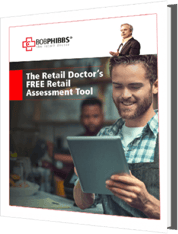
Take My FREE Retail Assessment Quiz
Use this free Retail Assessment Tool to discover where you truly excel in retail, and uncover areas for improvement.
